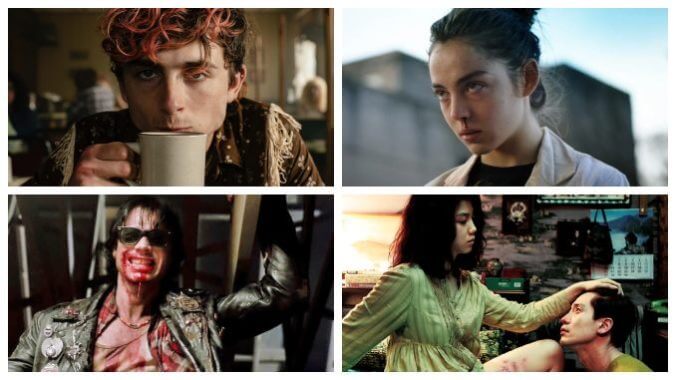Cinema of the Horror Outcast: The Road to Bones and All

“Soft bones,” Timothée Chalamet tweeted when Bones and All trailer first premiered. He followed it up with a second, sharply contrasting image: “Crunchy bones.” Having disoriented us, next, he serves a killer curveball: “Boney bones.” He’d given us a lot to think about, but Chalamet was unsatisfied at leaving the matter so plainly unresolved, finishing with “Boner bone.” Ever the provocateur.
With commentary like this, some will wonder how necessary external criticism is for Luca Guadagnino’s cannibal road-trip film Bones and All. But apart from explaining to confounded audiences why a cannibal drifter is, actually, the perfect role for Hollywood’s Sleepy Skinny Boy de jour, Bones and All can be contextualized with a wealth of similarly off-kilter, unsettling films that blend earnest romance and gruesome violence.
In the cinema of the Horror Outcast, we see cannibals, vampires and psychopaths are expelled from regular human society, and despite the overpowering thrills they get from eating flesh, drinking blood and taking lives, they’re all characterized by an inarticulable desire to exist in a world where they’re recognized, accepted and even validated. These feelings are internalized, channeled into bloody frustrations and existential reflections. As Guadagnino says, these are films that ask, “What is left when we don’t exist anymore?” More than that, these films ask at what stage of inhuman transformation do we stop existing, even if we keep living?
Bones and All doesn’t solely originate from this unofficial cinematic canon. Guadagnino and screenwriter David Kajganich adapted the 2015 young adult novel by Camille DeAngelis, and like Call Me By Your Name and Suspiria before it, Guadagnino takes liberties with his source material. The YA themes and structure still linger, resulting in a tension between the ardent romance of teenage “eaters” Maren (Taylor Russell) and Lee (Timothée Chalamet), and the upsetting emotional whiplash felt from their violence. This dual narrative is what defines the Horror Outcast subgenre; there is always an alternative perspective with which horror is interpreted, one defined by distinct narratological, religious or societal factors, complicating easy readings of horrific actions.
Take Terrence Malick’s landmark debut Badlands. Kit (Martin Sheen) is a garbage collector and unfeeling barbarian, who implicates his 15-year-old partner Holly (Sissy Spacek) in a string of murders across the American frontier. We understand how deadening Holly’s home life in South Dakota is, and her controlling father feels like a blueprint to Maren’s father in Bones and All’s opening scenes. Both young girls have constraints imposed on them to keep them away from fun, excitement and company, but both quickly subvert the romance of “run-away-with-me” tropes, as it’s revealed Maren’s father is more worried about protecting everyone else from his daughter, and Kit solves the problem of Holly’s father by shooting him dead.
With its undercurrent of dreary realism, Badlands serves as a counterpoint to the Bonnie and Clyde archetype of American infamy. Why Kit kills with such abandon is less interesting than the ways he and Holly negotiate their own system of ethics to avoid considering themselves monsters. Their fabricated impunity mirrors that of Maren and Lee, who want to enjoy the thrills of violence while avoiding the weight of morality, often committing to more violence with flimsy justifications: They’ve gone too far to turn back now; they need to cover their own tracks. You can’t set yourselves apart from the rules and conventions of society and then lament that you have no place in it.
Of course, Maren and Lee’s violence isn’t entirely committed by choice—their physiology compels them to consume human flesh no matter how hard they resist. Park Chan-wook’s vampire tale Thirst is especially relevant here: A priest, Sang-hyun (Song Kang-ho), becomes infected with vampirism, driving him from God’s light into the shadows of urban Korea. Song is an incredible performer, but Thirst, in all its gasping breaths and wet sounds, belongs to Kim Ok-bin, who plays a housewife, Tae-ju, who’s trapped in a loveless marriage under a punishing mother-in-law.
-

-

-

-

-

-

-

-

-

-

-

-

-

-

-

-

-

-

-

-

-

-

-

-

-

-

-

-

-

-

-

-

-

-

-

-

-

-

-

-








































